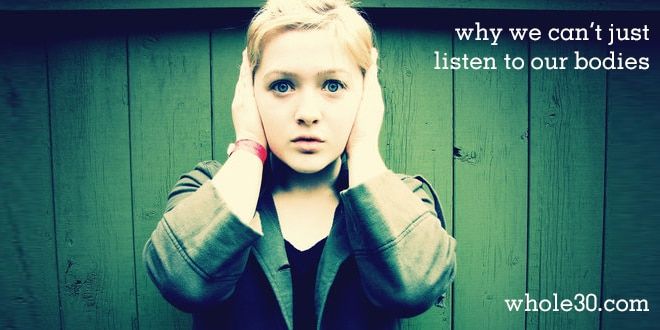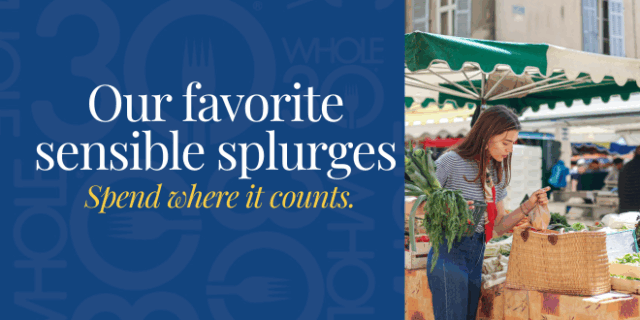This article is part of our “worst diet advice” series For those looking to lose weight and get healthier, there is certainly no shortage of dietary advice. Thousands of experts share their tips to “get beach-ready in just 6 weeks!” and “lose those last 10 pounds!” in magazines, newspaper articles, television programs, and website advertisements. While much of their advice is totally conflicting (“Eat breakfast to control your appetite!” “Skip breakfast and lose weight!”), there are some pieces of dietary advice that everyone seems to agree on. Today, we’ll touch on one of our favorites—a concept you’ll hear everyone talk about, yet most people find so hard to implement:
“Just listen to your body.”
Before you get all up in arms, let’s get one thing straight. We are huge proponents of intuitive eating, a philosophy which encourages you to change your relationship with food by listening to your body and eating according to its cues. It’s a simple concept grounded in biology and nature, and in theory should work exceptionally well to keep people happy, healthy, and in control of their food choices. It’s not that the advice to just listen to your body is bad, per se… it’s that it’s thrown out there as a sound bite, without any detailed explanation of exactly how to do it. If you’ve ever tried to unsuccessfully implement “just listen to your body,” you already know that most of us don’t know how to listen—and even if we did, we can’t trust the signals our bodies are sending us. Which makes us feel like a failure when diet experts say, “Oh, it’s just this easy!” but we still can’t figure it out.
Breathe Into Your Kidneys
Once in a yoga class, the instructor gave us a cue to “breathe into our kidneys.” I’d venture to say the vast majority of the class (myself included) had no idea what that meant, or how to go about doing it. This is the feeling many of you get when all those diet gurus insist that losing weight and getting fit is as simple as “just listening to your body.” Why is this so hard? First, most of you have been purposefully ignoring the signals your body has been desperately trying to send you for years—decades, even. Every time we go on a diet, our body screams at us to eat, and we deliberately ignore it. If we didn’t, we’d never be able to restrict calories—and it turns out we are really good dieters. In fact, many of us have been dieting our whole lives. That’s a heck of a lot of time spent ignoring our body’s signals, which means we’re now pretty used to tuning them out. We will also tune out those signals in favor of a number handed down by an “expert,” or a calculator we find on the internet. Our trainer tells us we need to eat one gram of protein per pound of bodyweight, and we stuff it in even when our body tells us, “really, no more, thank you.” The fitness calculator online tells us we need to eat less than 50 grams of carbs a day to lose weight, so we stick to that number, despite feeling tired and shaky during our workouts. Yep, for most of our lives, we have made a career of ignoring our bodies in the name of weight loss or fitness. But even if we could listen, our bodies have been lying to us for years because of the kinds of foods we’ve been eating. Calorie-dense, nutrient-poor, supernormally stimulating foods with no brakes lure us into poorly controlled cycles of cravings, overindulgence, and stress. We confuse hunger with other emotional responses because of the unhealthy associations we have with food (food as comfort, food as reward, food as morality). And we perceive signals to keep eating past the point of fullness because these foods lack satiety signals and nutrition. (1) These same foods send us on a blood sugar roller coaster where our bodies tell us we’re “hungry” when we’re not short on calories, we’re just dependent on sugar for energy. These foods and our eating habits make us leptin resistant, causing our bodies to tell us we’re too skinny and we need to keep eating. Our stressful lives (plus our food habits) promote cortisol resistance, where our body’s drive to consume sugar will always override our reserve of willpower. (2) You see the problem? We can’t listen to our bodies. At least, not until we change the foods we put on our plates.
How to Really Listen to Your Body
The answer isn’t to ditch the idea of “listening to your body.” The concept is brilliant—in fact, it’s ideal. Your body has complex and elegant regulatory mechanisms designed to keep you optimally healthy. It’s practically a miracle, the way all of your body’s systems and signals work together to keep you at a healthy weight, with a thriving metabolism and a robust immune system. You just have to get back to eating the way biology and nature intended, and let your body do its job. Stop eating foods with no brakes, and fill your plate with rewarding foods with the satiety and nutrition that always accompanies these foods in nature. Stop being over-reliant on sugar for energy, and teach your body to effectively utilize fat as fuel. Restore a healthy metabolism and hormonal balance by changing your diet, so your body’s messengers are no longer confusing you with misleading instructions. Change the food you put on your plate, and you’ll be able to trust the signals your body is sending you. When you feel hungry, you’ll know it’s because you’re actually hungry, not because your blood sugar is low or you’re lacking nutrition. So, you eat. When you get a signal to stop eating (and you’ll actually be getting signals to stop eating), it’s because your body is experiencing true satiety, not because some calculator or points system tells you “no more.” So, you stop. When you get those pangs in your stomach, you’ll be able to tell the difference between hunger and a craving, and act accordingly. And you will be able to act accordingly, because food will no longer control you. That’s how we really can listen to our bodies—and reap all of the benefits, including a healthier relationship with food, improved body composition, more energy, better sleep, and a sunnier outlook on life.
Get Started with Our Whole30® Program
Join the hundreds of thousands of people who have learned how to truly listen to their bodies with our critically-acclaimed Whole30 program and our meal planning template. Read our New York Times bestselling book, It Starts With Food, and visit https://whole30.com/new to learn more.
(1) Refer to Chapter 4 in It Starts With Food (2) Refer to Chapter 5 in It Starts With Food
















